- Home
- Jack Kerouac
Desolation Angels: A Novel Page 26
Desolation Angels: A Novel Read online
Page 26
That we all wander thru flesh, while the dove cries for us, back to the Dove of Heaven—
So I was writing to honor that, and had friends like Irwin Garden and Cody Pomeray who said I was doing okay and encouraged me though I was really too sweetly insane to listen to even them, I woulda done it anyway—What is the Light that bears us down—The Light of Falling—The Angels are still Falling—Some kind of explanation like that, hardly the thing for an N.Y.U. Seminar, kept me up so I could fall with man, with Lucifer, to Buddha’s eccentric humility ideal—(After all, why did Kafka write he was a Bug this big)—
And also dont think of me as a simple character—A lecher, a ship-jumper, a loafer, a conner of older women, even of queers, an idiot, nay a drunken baby Indian when drinking—Got socked everywhere and never socked back (except when young tough football player)—In fact, I dont even know what I was—Some kind of fevered being different as a snowflake. (Now talking like Simon, who comes up ahead.) In any case, a wondrous mess of contradictions (good enough, said Whitman) but more fit for Holy Russia of 19th Century than for this modern America of crew cuts and sullen faces in Pontiacs—
“Did I say all?” said Lord Richard Buckley before he died.
So the brew was this:—the boys were coming down to Mexico City to join me. The Desolation Angels again.
9
Irwin garden was an artist like me, the author of the great original poem “Howling,” but he never needed solitude the way I did, was continually surrounded by friends and sometimes dozens of acquaintances who would come to his door in beards rapping softly in the night—Irwin was never without his own immediate entourage, as you saw, beginning with his companion and lover Simon Darlovsky.
Irwin was queer and said so in public, thus precipitating tremors from Philadelphia to Stockholm in polite business suits and football coach pants—In fact, on the way down to join me (I am a non-queer) in Mexico Irwin had just removed all his clothes at a poetry reading in Los Angeles when a heckler’d yelled “Whattaya mean, naked?” (meaning the way he used the expressions “naked beauty” or “naked confessions” in his poems)—So he undressed and stood there nekkid before men and women, but a pretty cool crowd of ex-Parisian expatriates and surrealists however—
He was coming down to join me in Mexico with Simon, the blond Russianblood boy of 19 who originally was not queer but had fallen in love with Irwin and Irwin’s “soul” and poetry, so accommodated his Master—Irwin was herding two other boys before him to Mexico, one was Simon’s kidbrother Lazarus (15½) and the other Raphael Urso of New York a great young poet (the same who wrote “Atom Bomb” later and Time Magazine reprinted a piece of it to show how ridiculous but everybody loved it)—
First off, by the way, the reader should know that as an author I’d got to know many homosexuals—60% or 70% of our best writers (if not 90%) are queers, for man sex, and you get to meet them all and converse and swap manuscripts, meet them at parties, readings, everywhere—This doesnt prevent the nonhomosexual writer from being a writer or from associating with homosexual writers—Same was the case with Raphael, who “knew everybody,” as I did—I could give you a list a mile long of the homosexuals in the arts but there’s no point in making a big tzimis about a relatively harmless and cool state of affairs—Each man to his own tastes.
Irwin wrote and said they were arriving within a week so I hurried up and finished my novel in a burst of energy just in time for the date of their arrival, but they were two weeks late because of a silly stopover en route in Guadalajara to visit a dull woman poetess. So I ended up sitting on the edge of my tejado rooftop looking down on the street for the Four Marx Brothers to come walking down Orizaba.
Meanwhile Old Gaines was also anxious for their arrival, years of exile (from family and law in U.S.A.) had made him lonely and besides he’d known Irwin very well in the old days on Times Square when (1945) Irwin and I and Hubbard and Huck used to hang around the hustler bars picking up on drugs. In those days Gaines was in the height of his heyday as coat thief and used to lecture us on anthropology and archaeology sometimes in front of Father Duffy’s statue, tho no one listened. (It was I who’d finally hit on the great idea of listening to Gaines, tho Irwin had too, even in the early days.)
You can see by now Irwin is a weird cat. In my days on the road with Cody he’d followed us to Denver and everywhere bringing his apocalyptic poems and eyes. Now that he was a famous poet he was mellower, doing the things he’d always wanted to do, traveling even more, writing less though, but pulling in the skeins of his purpose—you might almost say “Mother Garden.”
I daydreamed of their arriving at night as I looked down from my roof edge, of what I’d do, throw a pebble, yell, mystify them somehow, but I never dreamed of their actual arrival in bleak reality.
10
I was sleeping, I’d been up all night scribbling poems and blues by candlelight. I usually slept till noon. The door scraped open and in walked Irwin alone. Back in Frisco old Ben Fagan the poet had told him: “Write to me when you get to Mexico and tell me the first thing you noticed about Jack’s room.” He wrote back: “Baggy pants hanging from nails on the wall.” He stood there looking around the room. I rubbed my eyes and said “Damnit you’re two weeks late.”
“We slept at Guadalajara and dug Alise Nabokov the strange poet. How weird her parrots and her pad and her husband—How are you Jacky?” and he laid his hand tenderly on my shoulder.
It’s strange what long trips people take in their lifetimes, Irwin and I who’d started as friends on the Columbia campus in New York now facing each other in a dobe hovel in Mexico City, the histories of people oozing out like long worms across the plaza of the night—Back and forth, up and down, sick and well, it makes you wonder what the lives of our ancestors were also like. “What were the lives of our ancestors?”
Irwin says “Giggling in rooms. Come on, get up, at once. We’re going downtown right away to dig Thieves’ Market. Raphael has been writing big mad poems all the way down from Tijuana about the doom of Mexico and I wanta show him some real doom, for sale in the market. Did you ever see the broken armless dolls they sell? And old rickety wormeaten Aztec wooden statues you cant even carry—”
“Used can openers.”
“Strange old shopping bags from 1910.”
We were at it again, every time we got together the conversation became a poem swinging back and forth except when we had stories to tell. “Old curds of milk floating in pea soup.”
“What about your pad?”
“The first thing, yah, we have to rent one, Gaines says we can get the one downstairs cheap and there’s a kitchen.”
“Where are the boys?”
“All in Gaines’ room.”
“And Gaines’ talking.”
“Gaines is talking and telling them all about Minoan Civilization. Let’s go.”
In Gaines’ room Lazarus the 15-year-old weirdy who never speaks sat listening to Gaines with honest innocent eyes. Raphael was slumped in the old man’s easy chair enjoying the lecture. Gaines lectured from the edge of the bed with a necktie between his teeth as he pulled tight to make a vein pop or make something happen to give himself a needle shot of morphine. Simon stood in the corner like a saint in Russia. It was a great occasion. There we were all in the same room.
Irwin received a shot from Gaines and lay down on the bed under the pink drapes and sighed. Laz the child received one of Gaines’ soft drinks. Raphael thumbed thru The Outline of History and wanted to know Gaines’ theory of Alexander the Great. “I wanta be like Alexander the Great,” he yelled, he somehow always yelled, “I wanta dress in rich jeweled general outfits and swing my sword at India and go glimpsing at Samarkand!”
“Yeah,” I said, “but you dont wanta have your first lieutenant buddy murdered or have a whole village of women and children killed!” The argument started. I remember now, the first thing we did was argue about Alexander the Great.
Raphael Urso I liked quite well,
too, in spite or perhaps because of a previous New York hassle over a subterranean girl, as I say. He respected me tho he was always talking behind my back, in a way, tho he did that to everybody. For instance he whispered to me in the corner “That Gaines is a grippling.”
“What you mean?”
“The day of the grippling is come, the hunchback creep …”
“But I thought you liked him!”
“Look at my poems—” He showed me a notebook full of scribblings in black ink and drawings, excellent eerie drawings of starved children drinking from a big fat Coca-Cola bottle with legs and teats and a hank of hair labeled “Mexico Doom.” “There’s death in Mexico—I saw a windmill turning death this way—I dont like it here—and your old Gaines is a grippling.”
As an example. But I loved him too because of his utterdust broodings, the way he stands on a streetcorner looking down, at night, hand to brow, wondering where to go in the world. He dramatized the way we all felt. And his poems did that best of all. That kind of old invalid Gaines was a “grippling” was merely Raphael’s cruel but honest horror.
As for Lazarus, when you ask him “Hey Laz, are you okay?” he just looks up with innocent level blue eyes and a slight almost cherubic hint of a smile, sad, and doesnt need to reply. If anything, he reminded me more of my brother Gerard than anyone in the world. He was a tall slumping teenager with pimples but a handsome profile, completely helpless if it hadnt been for the care and protection of his brother Simon. He couldnt count money too well, or ask directions without getting involved, and least of all get a job or even understand legal papers and even newspapers. He was on the verge of catatonia like an older brother now in an institution (an older brother who had been his idol, by the way). Without Simon and Irwin to herd him along and protect him and provide him with bed and board, the authorities would have netted him at once. Not that he was cretinous, or unintelligent. He was extremely brilliant in fact. I saw letters he wrote at age 14 before his recent spell of silence: they were perfectly normal and better than average writings, in fact sensitive and better than anything I could have written at 14 when I also was an innocent introverted monster. As for his hobby, drawing, he was better at that than most artists alive today and I always knew he was really a great young artist pretending to be withdrawn so people would leave him alone, also so people wouldnt ask him to get a job. Because often I’ve seen the strange side glance he gives me which is like the look of a fellow or a brother conspirator in a world of busybodies, say—
Like the look that says: “I know, Jack, that you know what I’m doing, and you’re doing the same thing in your way.” For Laz, like myself, also spent whole afternoons staring into space, doing nothing whatever, except maybe brush his hair, mostly just listening to his own mind as tho he too was alone with his Guardian Angel. Simon was usually busy, but during his semiannual “schizophrenic” spells he withdrew from everybody and also sat in his room doing nothing. (I’m telling you, these were real Russian brothers.) (Actually partly Polish.)
11
When Irwin had first met Simon, Simon pointed to trees and said “See, they’re waving at me and bowing hello.” Besides all that weird interesting native mysticism, he was really an angelic kid and for instance now in Gaines’ room he immediately undertook to empty the old man’s pail upstairs, even rinsed it, came down nodding and smiling at the curious landladies (the landladies hung out in the kitchen boiling pots of beans and heating tortillas)—He then cleaned up the room with broom and dustpan, moved us all sternly aside, wiped clean the wall table and asked Gaines if he wanted anything at the store (almost with a bow). His relation to me was, like he’d bring me two fried eggs on a plate (later) and say “Eat! Eat!” and I’d say no I wasn’t hungry and he’d yell “Eat, you brat!! If you dont watch out we’ll have a revolution and make you work in the mills!”
So between Simon, Laz, Raphael and Irwin there was plenty of fantastically funny action going on, especially when we all sat down with the head landlady to hassle over the rent of their new apartment which was to be on the ground floor with windows opening on the tile courtyard.
The landlady was actually a European lady, French I think, and since I’d told her the “poets” were coming she sat somewhat politely and ready to be impressed on the couch. But if her vision of poets was of some caped de Musset or elegant Mallarmé—just a bunch of hoods. And Irwin haggled her down 100 pesos or so with arguments about no hot water and not enough beds. She said to me in French: “Monsieur Duluoz, est ce qu’ils sont des poètes vraiment ces gens?”
“Oui madame,” answered Irwin himself in his most elegant tone, assuming the role he called “the well groomed Hungarian,” “nous sommes des poètes dans la grande tradition de Whitman et Melville, et surtout, Blake.”
“Mais, ce jeune là.” She indicated Laz. “Il est un poète?”
“Mais certainement, dans sa manière” (Irwin).
“Et bien, et vous n’avez pas l’argent pour louer à cinq cents pesos?”
“Comment?”
“Five hundret pesos—cinquo ciente pesos.”
“Ah,” says Irwin leaping into Spanish, “Sí, pero el departamiento n’est pas assez grande for the whole lot.”
She understood all three languages and had to give in. Meanwhile, that settled, we all rushed out to dig Thieves’ Market downtown but as we emerged on the street some Mexican kids drinking Cokes gave out a long low whistle at us. I was enraged because not only I was subjected to this now in the company of my motley weirdy gang but I didnt think it was fair. Yet Irwin, that international hepcat, said “That’s not a whistle addressed at queers or anything you’re thinking in your paranoia—it’s a whistle of admiration.”
“Admiration?”
“Certainly” and several nights later sure enough the Mexicans rapped on our door with Mescals in their hands, wanting to drink and toast, a bunch of Mexican medical students in fact living two flights above us (more later).
We started off down Orizaba Street on our first walk in Mexico City. I walked with Irwin and Simon in front, talking; Raphael (like Gaines) walked far to the side alone, along the curb, brooding; and Lazarus stomped along in his slow monster walk a half a block behind us, sometimes staring at the centavos in his hand and wondering where he could get an ice cream soda. Finally we turned around and found him stepping into a fish store. We all had to go back and get him. He stood there before giggling Mexican girls holding out his hand with the centavos in it saying “Ice crim suda, I wanta ice crim suda” in his funny New York accent, muttering at them, looking at them innocently.
“Pero, señor, no comprendo.”
“Ice crim suda.”
When Irwin and Simon gently led him out, once again as we resumed our walk he fell behind half a block and (as Raphael now cried sadly) “Poor Lazarus—wondering about pesos!” “Lost in Mexico wondering about pesos! What will ever happen to poor Lazarus! So sad, so sad, life, life, who can ever stand it!”
But Irwin and Simon walked gaily ahead to new adventures.
12
So my peacefulness in Mexico city was at an end tho I didnt mind too much because my writing was done for awhile but it was really too much the next morning when I was sleeping sweetly on my solitary roof Irwin bursting in “Get up! We’re going to Mexico City University!”
“What do I care about Mexico City University, let me go sleep!” I was dreaming of a mysterious world mountain where everybody and everything was, why bother?
“You fool,” said Irwin in one of the rare instances when he let slip what he really thought of me, “how can you sleep all day and never see anything, what’s the sense of being alive?”
“You invisible bastard I can see right thru you.”
“Can you really?” suddenly interested sitting on my bed. “What does it look like?”
“It looks like a lot of little Gardens are going to travel prating to the grave, talking about wonders.” It was our old argument about Samsara vs. Nirvana t
ho the highest Buddhist thinking (well, Mahayana) stresses that there is no difference between Samsara (this world) and Nirvana (the no-world) and maybe they’re right. Heidegger and his “essents” and his “nothing.” “And so if that’s the case,” says I, “I’m going back to sleep.”
“But Samsara is just the X-mystery mark on the surface of Nirvana—how can you reject this world, ignore it like you try, poorly really, when it is the surface of what you want and you should study it?”

 Tristessa
Tristessa On the Road
On the Road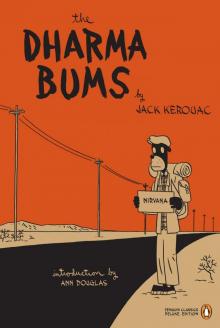 The Dharma Bums
The Dharma Bums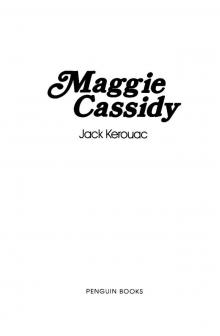 Maggie Cassidy
Maggie Cassidy Big Sur
Big Sur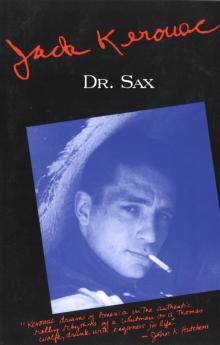 Dr. Sax
Dr. Sax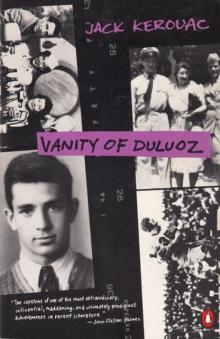 Vanity of Duluoz: An Adventurous Education, 1935-46
Vanity of Duluoz: An Adventurous Education, 1935-46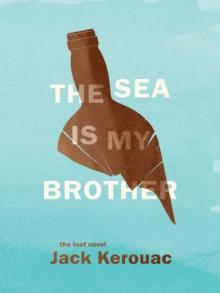 The Sea Is My Brother
The Sea Is My Brother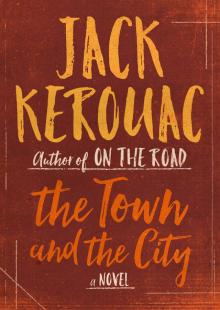 The Town and the City: A Novel
The Town and the City: A Novel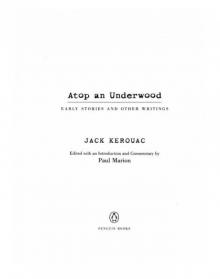 Atop an Underwood: Early Stories and Other Writings
Atop an Underwood: Early Stories and Other Writings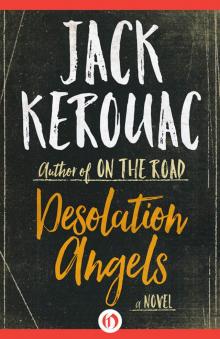 Desolation Angels: A Novel
Desolation Angels: A Novel Book of Sketches
Book of Sketches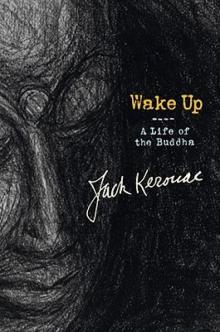 Wake Up: A Life of the Buddha
Wake Up: A Life of the Buddha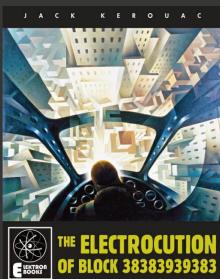 The Electrocution of Block 38383939383
The Electrocution of Block 38383939383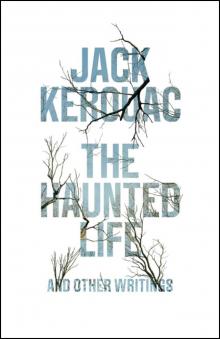 Haunted Life
Haunted Life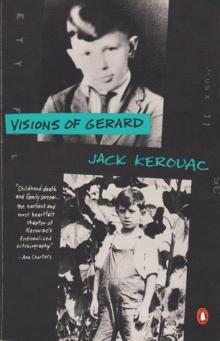 Visions of Gerard
Visions of Gerard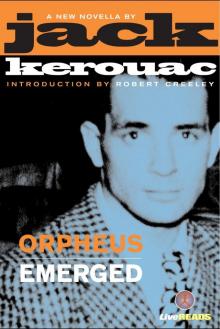 Orpheus Emerged
Orpheus Emerged Book of Blues
Book of Blues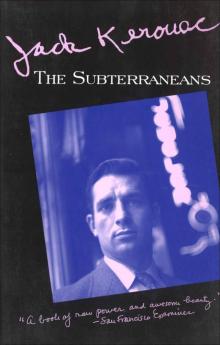 The Subterraneans
The Subterraneans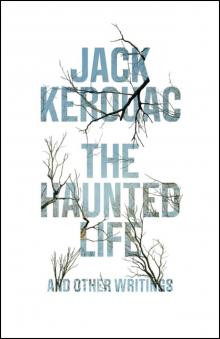 The Haunted Life
The Haunted Life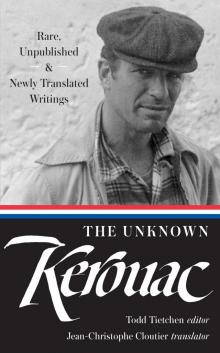 The Unknown Kerouac
The Unknown Kerouac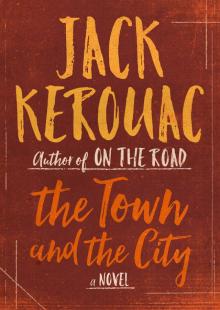 The Town and the City
The Town and the City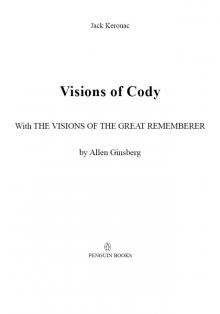 Visions of Cody
Visions of Cody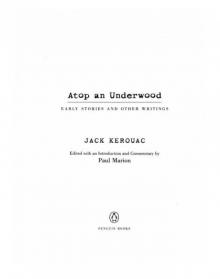 Atop an Underwood
Atop an Underwood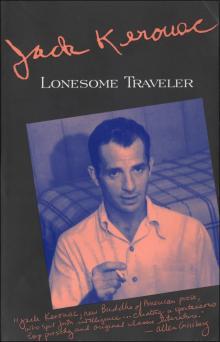 Lonesome Traveler
Lonesome Traveler Jack Kerouac and Allen Ginsberg
Jack Kerouac and Allen Ginsberg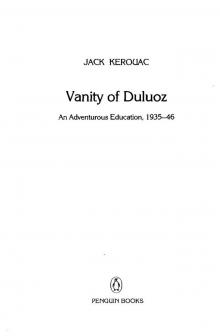 Vanity of Duluoz
Vanity of Duluoz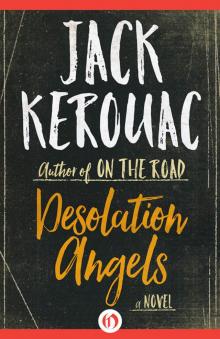 Desolation Angels
Desolation Angels On the Road: The Original Scroll: (Penguin Classics Deluxe Edition)
On the Road: The Original Scroll: (Penguin Classics Deluxe Edition)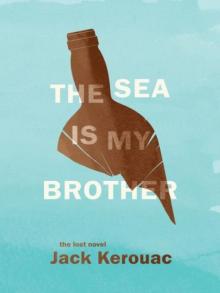 The Sea Is My Brother: The Lost Novel
The Sea Is My Brother: The Lost Novel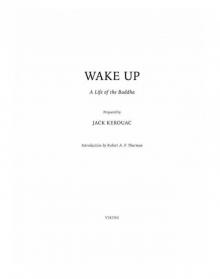 Wake Up
Wake Up The Poetry of Jack Kerouac
The Poetry of Jack Kerouac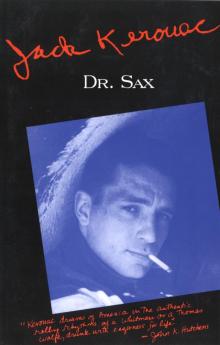 Doctor Sax
Doctor Sax